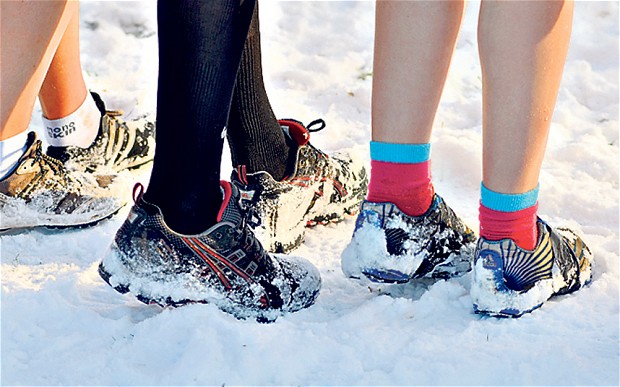Why I ran a Marathon in frozen Siberia

Lucy Ward braves frostbite and snow fields to take part in a race over ice-covered Lake Baikal, Siberia.

The Baikal marathon is widely regarded as one of the toughest global running events
By Lucy Ward
12:04PM GMT 20 Mar 2012
I am, categorically, no iron woman, and much prefer my marathons to be the chocolate sort, so it’s still a little mystifying that I found myself this month jogging, balaclava-clad, across a mile-deep frozen Siberian lake.
The Baikal International Ice Marathon, now in its eighth year and growing annually, is widely regarded as one of the toughest global running events, even at a time when such extreme challenges in the planet’s wildest corners are growing in popularity.
Competitors run across sheet ice and snow hummocks from shore to shore of frozen Lake Baikal, a vast natural wonder containing over a fifth of the Earth’s fresh water and an unparalleled ecology, as well as geothermal currents which occasionally crack its 1.5m (5ft) thick winter glaze.
I ended up in eastern Siberia (running only the half marathon, which finishes unnervingly in the centre of the lake) through curiosity and, strangely, semi-proximity. Our family is living in Moscow for a couple of years, and from here the flight to Irkutsk is a mere five hours.
Here in the Russian capital, we’ve become entirely used to snow, ice and temperatures well below zero, so the idea of carrying on the running I was used to at home (albeit a lot more seriously) didn’t seem too crazy, and the thought of a Siberian event was far less daunting than it would have appeared from England.
When a friend’s husband completed the Baikal half last year and returned with tales of vast white icy expanses – and, admittedly, mild frostbite – my desire to get closer to Baikal, the famed “soul of Siberia”, only increased.
I signed up myself and my partner, and began pacing the embankment of the frozen Moskva river. As the temperatures dropped in January, I pressed on, resorting to the treadmill only when it got below -20C (-4F). I invested in waterproof trail shoes, snow gaiters, running spikes and a ninja-style balaclava that made passers-by dodge from my path.
Most runners (130 of us from 20 countries) arrived at least two days early for the March 3rd run, assembling in the lakeside village of Listvyanka. Nerves jangled as the race director revealed the course had been changed to avoid cracks: “Baikal, she is breathing,” he explained.
The conditions on Baikal are so out of the ordinary that they act as something of a leveller: there were hardened ultra-runners (Chris from Sheffield had run the gradient-filled Windermere marathon 10 times in as many days), as well as a pleasing group of crazy amateurs. Oisean from Dublin had agreed to take part in a drunken bet, shopping for equipment at the last minute and growing a beard to try to fend off the cold (it didn’t work: his whiskers iced up).
The run, I won’t deny, was something of a slog: even the toasts we drank in milk at the start to appease the lake spirits could not moderate the toughness of a featureless ice field where the brain can find no progress markers and distances are impossible to gauge. Yet the sense of achievement on reaching the little wooden hut set up in mid-lake after 21km (13 miles) and two hours 25 minutes was extraordinary, and as we drove back by hovercraft the otherworldly beauty of Baikal worked its magic.
The original article is here: http://www.telegraph.co.uk/active/9155272/Why-I-ran-a-marathon-in-frozen-Siberia.html
